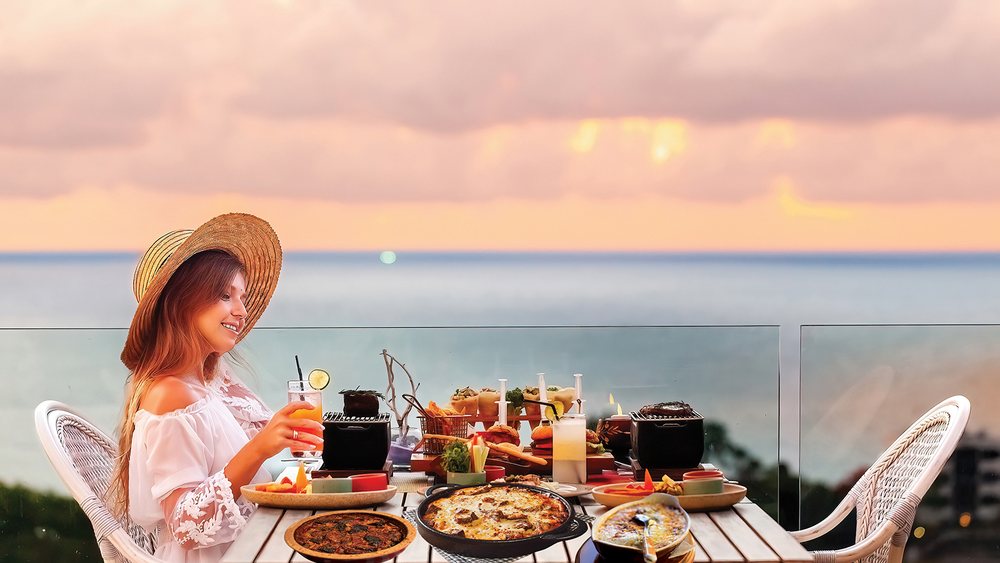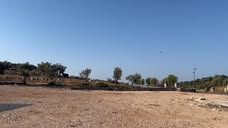
Traditional Albanian dishes, once missing from menus, are experiencing a strong comeback driven by foreign tourist demand for authentic experiences. Each dish, such as tava e kosit, lakrori or pentullat e fshira, is not just a taste – it is a story that sells. Now not only the special flavors, but also the affordable prices and the use of local products are becoming a unique advantage for the economy. This trend is helping to increase the value of the tourist experience, but also to revitalize local production, through direct connections with farmers and local products.
Yogurt-filled trahana, lakrori in sac, and tava e yosit are no longer just home-cooked dishes but have become culinary experiences that foreigners eagerly seek out. For less than 20 euros, tourists enjoy a full lunch, served with care and history, a rare luxury in today’s Europe. But it’s not just the price that attracts them – it’s the tradition.
Forgotten dishes like yshmeria, chamae slippers or cheese-filled kulaçi are returning to the menu, driven by the desire to experience a real Albania, beyond the classic guidebooks. In this silent return of tradition, tourists have become the best ambassadors of Albanian cuisine.
In the heart of Tirana, where hundreds of foreign visitors stroll every day, it is not unusual to find a plate of pork for 800 lekë, a glass of house wine for 300 lekë or a fresh salad for just 400 lekë. A full meal, with authentic flavors and local products, for less than 2,000 lekë – this is what surprises visitors the most.
This affordability, combined with hospitality and traditional flavors, is transforming Albanian gastronomy into one of the strongest points of tourism.
"In a time when cuisines are globalized, we believe that authenticity is the greatest value," says Jurgen Bame, from "Era Restaurant".
According to him, tradition is not an obstacle to the further development of tourism, but the foundation on which new and unforgettable experiences can be built.
A journey into a forgotten taste: How tourists are bringing pancakes and lakrori back to Albanian menus
Albania has long been a destination that captivates with its landscapes and rich history, but for many visitors, the biggest surprise lies in the dishes. Behind every meal served in a local restaurant, there is a story – not only that of a cuisine with Ottoman, Balkan and Mediterranean influences, but also a silent return of a tradition that had once disappeared from restaurant tables.
Albanian cuisine, rich and diverse, once lived only in the home: dishes like fried pancakes, qifqit, yshmeria, or lakrori with nettles were rarely found on restaurant menus. These dishes, closely linked to the memory of grandmothers and home kitchens, were for a time seen as unsuitable for the gastronomy of the market that had long been driven by international dishes such as pasta, pizza, risotto, etc.
Today, restaurants in tourist areas, from the Alps to the Coast, are adding precisely these dishes to their menus, driven by a growing demand from foreign visitors.
“Tourists are no longer just looking for a plate of meat or a cold beer – they are looking for experience, authenticity, history in every bite.
"The return of Albanian tradition is a long and challenging path, but it is bringing new life to the culture and identity of this country," Enri Jahaj, head of the Association of Bars and Restaurants, told "Monitor".
Mr. Jahaj says that restaurants should give their menus an Albanian spirit and should no longer be limited to Balkan dishes.
"When it comes to cooking, I think we should no longer stick to traditional Balkan dishes, we should give it an Albanian, Mediterranean spirit, and this is the merit of the chefs, of those who are open-minded and willing to dare," he says.
Petrit Fiska, from the well-known agrotourism "Alpeta" in Berat, says that based on tourist demand, they always include lakrori and yshmeri on the menu.
"We initially offered them as daily dishes, but the demand was so high that they became staple dishes."
In addition to pancakes and lacroir, the menus of restaurants, especially those in agrotourism, feature other old dishes such as:
– Grapevine leaf yams
– Trahanaja stuffed with yogurt
– Cheese-filled cake
– Zucchini casserole
– Cornbread with peppers and yogurt
– Oven-baked meatballs with tomatoes and nard
– Slippers from Chameria or Pula with a flat sole
These dishes have slowly returned to the spotlight, rewritten by the enthusiasm of local chefs with a high interest in the tradition from tourists.
"In traditional food, everyone finds themselves. The presentation of the menu also plays an important role - the customer feels more special when faced with a curated, unique menu that represents traditional dishes and not recipes that you can find everywhere."
"Today, even in rural areas, opening a traditional restaurant is increasingly appropriate, as the menu is naturally linked to the tradition and history of the country," says Ismet Shehu, founder of the "Çeren" restaurant chain.
This comeback is more than just a gastronomic trend. It is an affirmation of Albanian identity through food, a way to tell history not with words, but with taste. And in a country where cuisine has always been experienced as part of life, this is perhaps the best form of hospitality.
“Pjata shqiptare më e porositur nga turistët është ‘Tava e famshme e Elbasanit’ – tava e kosit”, – thotë Jurgen Bame, drejtor marketingu i “Era Restaurant”, një rrjet restorantesh që përveç gatimeve ndërkombëtare, ka në fokus të veçantë kuzhinën tradicionale shqiptare.
“Pjata më e kërkuar është mishi i qengjit dhe byreku i pjekur në saç”, – shprehet Andi Prifti, administrator i “Oda Garden”, një nga restorantet më të frekuentuara për gatime tradicionale.
I vendosur në zonën e Pazarit të Ri, restoranti është bërë një pikë referimi për vizitorët që kërkojnë një menu të lidhur me traditën, por edhe një ambient që ruan elementet karakteristike të Tiranës së vjetër.
Kthimi drejt traditës, shtysë për prodhimin vendas
Rritja e kërkesës për kuzhinën tradicionale shqiptare po ndikon drejtpërdrejt në nxitjen e prodhimit vendas, veçanërisht në sektorin bujqësor. Me gjithnjë e më shumë restorante dhe agroturizme që kthehen te receta dhe produkte të zonës, po rritet edhe bashkëpunimi me fermerët lokalë.
Altin Prenga, nga “Mrizi i Zanave”, thekson se pa produkte vendase, modeli i tij nuk do të funksiononte:
“Nëse nuk do të kisha produkte vendase, nuk do të arrija të faturoja as 55% të punës që bëj – ndoshta do të isha mbyllur”.
Ai shton se identiteti gastronomik që ofrohet nëpërmjet këtyre produkteve është pikërisht ajo që kërkojnë sot vizitorët, si vendas ashtu edhe të huaj. Në të njëjtën linjë, Fundim Gjepali nga agroturizmi “Gjepali” në Shijak tregon se bashkëpunon rregullisht me 25 deri në 30 fermerë.
“Ajo që kemi vënë re është se prodhimi rritet çdo vit – ka më shumë mundësi dhe më shumë interes nga të dyja palët”, – thotë ai.
Për të, është i dukshëm transformimi i sektorit: “Po kalojmë një fazë ku bujqësia, edhe pse e ngadaltë, po ndërgjegjësohet dhe po kthehet në burim dinjitoz të ardhurash”. Megjithatë, sipas tij, fermerët mbeten ende të paorganizuar dhe nevojitet më shumë bashkëpunim dhe mbështetje për të strukturuar këtë zinxhir.
“Jemi ende në një fazë ‘kurdisjeje’ të tregut”, – shton ai, duke theksuar se transformimi real kërkon këmbëngulje, lidership dhe politika të qëndrueshme mbështetëse.
Restorantet që promovojnë traditën nuk janë më thjesht konsumatorë, por po kthehen në motorë të qëndrueshëm të zhvillimit rural, duke krijuar kërkesë të vazhdueshme për prodhime cilësore dhe të stinës.
Numri i turistëve në restorante rritet vit pas viti
Sipas operatorëve në treg, numri i turistëve që kërkojnë gatime lokale është rritur ndjeshëm, sidomos në sezonin veror. Fiska, i agroturizmit “Alpeta”, raporton një rritje prej 25–30% të numrit të vizitorëve çdo vit.
“Sa më shumë autentik të jetë ushqimi, aq më të kënaqur mbeten klientët tanë”, – thotë ai, duke shtuar se menuja e tyre bazohet në atë që prodhojnë vetë në fermë – që nga byreku dhe lakrori, deri te mishi i qengjit.
Përballë këtij fluksi, gjithnjë e më shumë restorante po vendosin menutë jashtë lokalit, si përgjigje ndaj kërkesës në rritje për transparencë.
"Menus outside, in restaurants, are being set more and more, because the market dictates it," says Mr. Jahaj.
"Tourists are a key factor, they ask for prices in advance, to make their calculations."
But this trend has also been influenced by domestic consumers, especially generations X and Z, who are very price-sensitive.
They want to better organize their money and consider every element – price, comments, online ratings, everything – before deciding where to spend."
Local beer is losing ground, wine and brandy remain favorites
While Albanian wine and rakia are gaining ground on summer menus, local beers are facing challenges. Mirko, a tourist from the Czech Republic, says that among Albanian drinks, rakia and wine are his favorites.
"I really liked Albanian wine and raki, they are special and different from what I have tried before in other countries. I like the fact that they are traditional products with history," he says.
Olsi Risto, administrator of the "Duka" winery, says that tourists prefer wine to local drinks.
"Wine is the most sought after among us, but rakia is not far behind, as for many foreigners, tasting rakia is the first time."
The price of Albanian bottled beers has been equalized to that of foreign brands, causing tourists to more often choose international brands, which they perceive as safer and with guaranteed quality.
Kriko beer remains very popular, especially among Czech tourists and those seeking a more authentic experience in restaurants with grilled meat and traditional products, says Ditmir Reçi, from the "Tymi" restaurant.
"Albanian beer is light, with a fresh taste, but not like we are used to," says a tourist from Poland, while another visitor from Austria adds: "The rakia was an experience in itself - strong, but with character!"/ Monitor






















